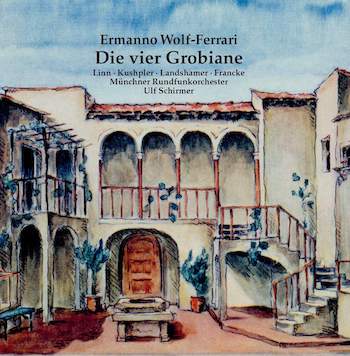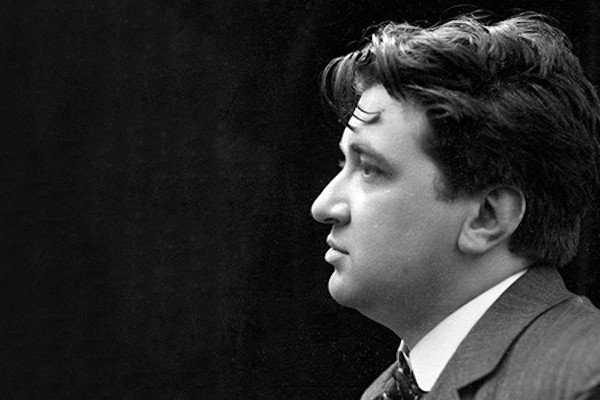Opera Album Review: An Italian Comic Opera, or Is It a German One? You Decide
By Ralph P. Locke
Ermanno Wolf-Ferrari’s delightful 1906 comic opera via the first recording of the version heard at the work’s premiere.
Christina Landshamer (soprano), Zoryana Kushpler (mezzo-soprano), Jürgen Linn (bass-baritone), Victor von Halem (bass), Susanne Bernhard (soprano), Nathalie Flessa (mezzo-soprano), Markus Francke (tenor), Peter Schöne (baritone), Christine Buffle (soprano), Uwe Eikötter (tenor), Friedemann Röhlig (bass).
Munich Radio Orchestra, cond. Ulf Schirmer.
CPO 555140-2 [2 CDs] 130 minutes.
To purchase, click here.
 In the September/October 2018 issue of American Record Guide, I reviewed a fine new recording of Ermanno Wolf-Ferrari’s delectable comic opera I quatro rusteghi (more or less: The Four Curmudgeons or, perhaps, The Four Stubborn Dads), conducted by Vasily Petrenko. The work received its first performed in 1906 in Munich in German translation (entitled Die vier grobiane) and only got heard in the original Italian eight years later, in Milan. (To be more precise, the Italian words that the characters sing are mostly in Venetian dialect.)
In the September/October 2018 issue of American Record Guide, I reviewed a fine new recording of Ermanno Wolf-Ferrari’s delectable comic opera I quatro rusteghi (more or less: The Four Curmudgeons or, perhaps, The Four Stubborn Dads), conducted by Vasily Petrenko. The work received its first performed in 1906 in Munich in German translation (entitled Die vier grobiane) and only got heard in the original Italian eight years later, in Milan. (To be more precise, the Italian words that the characters sing are mostly in Venetian dialect.)
The present recording is the work’s first-ever in German and thus its own kind of world premiere, arriving more than a century after the actual world premiere, which, as I said, was in German! Best of all, the singers are nearly all native German-speakers, and the result demonstrates once again a point that I have been making here at The Arts Fuse about the benefits of doing opera in a language that the singers have known their whole lives. (See my observations on Pietro Mascagni’s colorful I Rantzau. August Enna’s Kleopatra — a major Danish work from 1894 — and Naga by Emerson College’s Scott Wheeler,)
Wolf-Ferrari (1876-1946) is a fascinating composer: he was born in Venice to a German father and Italian mother, studied in both countries, and was subsequently active in both. Two other operas of his, Il segreto di Susanna and Sly, have been treated to fine recordings featuring such major singers as Renata Scotto and José Carreras.
The libretto for Rusteghi (Grobiane) is freely based on a 1760 comedy by Carlo Goldoni. The plot hangs on the insistence of four fathers that a young couple should only get married if, according to local tradition, the two individuals do not get to know each other at all before the wedding ceremony. Each of the roles is important, making it a bit like Mozart’s Così fan tutte, but with eleven characters instead of six.
The music is tuneful, attractively harmonized, and exquisitely orchestrated, as record collectors know from a few orchestral excerpts that have been often recorded — notably the intermezzo (i.e., prelude) before Act 2. If you are wondering what Italian opera around Puccini’s time could be like without an admixture of verismo intensity, here’s a good answer. The work is extremely attractive and poised, not least through its conscious evocation of style elements from operetta and from Mozart-era opera. This time around, though, I couldn’t help but also be reminded (because of the German words) of the sunnier moods of Mahler, as at the beginning of Act 1, Scene 4.
Particularly delightful is Wolf-Ferrari’s skill at differentiating the characters, and their shifting moods, from sneaky and suspicious to grandiose or elated. The main “father” character (Lunardo) has a tendency to repeat a word or phrase several times, as if comically sputtering in annoyance.
There is also much amusing unison and chordal singing for the fathers or other groupings of characters (Act 1, Scene 8). Passages suggest that Wolf-Ferrari was closely familiar with Verdi’s Falstaff and perhaps also took some inspiration from Wagner’s Die Meistersinger, a work that had much success in Italy in translation (see my review of a superb Italian Radio performance). The famous “Grossvater-Tanz” (used by Schumann and Tchaikovsky) gets quoted prominently at the ends of Acts 2 and 3. (This goes unmentioned in the written discussions of the opera that I have consulted.)
The orchestra also gets some chances to shine, as in the aforementioned Intermezzo, based on a traditional ballad sung by Marina in Act 1, Scene 5, that sounds a bit like the “Carnival of Venice” tune (a.k.a. “My Hat It Has Three Corners”). The scene-changing music that precedes Marina’s ballad provides a refreshingly expansive moment in a work that otherwise chatters at us (quite amusingly) almost without pause. And often, in the opera’s main scenes, the orchestra — a bassoon, the brass section, etc. — comments on a character’s most recent statement.
The singers here are fully as professional and even at times as eloquent as those in previous (Italian-language) recordings, and, because most of them are native German-speakers, they have no problem matching, in their own way, the verbal and theatrical alertness of the all-Italian cast on the wondrous old (mono) Alfredo Simonetto recording from 1951 starring Fernando Corena. The eleven heard here deserve to be named, along with their roles in the opera’s plot: Jürgen Linn, Zoryana Kushpler, and Christine Landshamer as one pair of parents and their daughter; Susanne Bernhard, Peter Schöne, and Markus Francke as another pair of parents and their son (the two young people eventually realize they love each other and get married); and, as other busybodies, Christine Buffle, Nathalie Flessa, Uwe Eikötter, Victor von Halem (a veteran basso whom I saw nearly fifty years ago as a superb Osmin in Mozart’s Die Entführung aus dem Serail), and Friedemann Röhlig.
I must express special appreciation for Landshamer and Francke, compact and eloquent as the two young lovers and Linn and von Halem, both of whom have voices that ripen toward the bottom instead of becoming gravelly. Such true basses and bass-baritones are currently in short supply in the opera world (as Conrad L. Osborne rightly points out in his recent book Opera As Opera (see my review in The Boston Musical Intelligencer). Von Halem was 74 when the recording was made, but sounds as firm and clear as all the others. Very impressive! During his long career, was he careful not to take on roles that were too heavy and not to sing in halls that were too large?
The recording comes from performances in 2014, when Ulf Schirmer, the first-rate conductor, was artistic director of the (superbly responsive here) Munich Radio Orchestra. The performances took place in the acoustically superb Prinzregenten Theater and, by the aural evidence, were unstaged: the singers all sound as if they are standing near each other without moving. As a result, quick exchanges are always clearly audible. The microphones pick up a few moments of quiet chuckles from the well-behaved audience. Applause only at the ends of acts (as has long been the general practice in German opera houses).

Ermanno Wolf-Ferrari — a fascinating composer.
I quatro rusteghi (not quattro — the spelling is Venetian) has had multiple recordings, several of which have been available at times on CD. The aforementioned recent Petrenko recording has many strengths: excellent vocal control on the part of all the singers, a fine orchestra, and rich and clear recorded sound. Still, the heavily international cast gives the impression of having been well trained in a tricky and quick-moving Italian/Venetian text that is, however, not quite native to most of them.
The new recording, despite the oddity of its being sung in German, is perhaps the most convenient way to get to know, in fine modern sound, this exquisitely crafted and rarely staged comic opera. Most helpfully, the libretto is printed in German and good English, whereas the Petrenko recording provided the Italian/Venetian libretto but, in English, only prose summaries of each scene.
The booklet includes (besides the libretto) a fine essay and synopsis. These are translated a bit more stiffly than the libretto, but you’ll get the drift.
For a sense of how vital this work can be when sung by Italians, I urge opera lovers to listen to its aforementioned first recording (1951), conducted by Alfredo Simonetto. It is currently on YouTube but deserves to be released on CD, with a printed and translated libretto. For present purposes, you could even buy the new recording for its own great merits and also use its translated libretto to help you follow the Simonetto recording. (People who subscribe to Naxos Music Library can download the booklet for free.)
Still, I am thrilled to have gotten to know this amazing light opera now in a second language (German) and would love to hear it in a third: English. Edward J. Dent’s “splendidly witty translation,” under the title School for Fathers, was a “resounding success” in London in 1946 (according to OxfordMusicOnline). I should think the work, with its numerous roles, none of them enormously demanding, would be a natural for a high-level conservatory or university music school.
Ralph P. Locke is emeritus professor of musicology at the University of Rochester’s Eastman School of Music. Six of his articles have won the ASCAP-Deems Taylor Award for excellence in writing about music. His most recent two books are Musical Exoticism: Images and Reflections and Music and the Exotic from the Renaissance to Mozart (both Cambridge University Press). Both are now available in paperback; the second, also as an e-book. Ralph Locke also contributes to American Record Guide and to the online arts-magazines New York Arts, Opera Today, and The Boston Musical Intelligencer. His articles have appeared in major scholarly journals, in Oxford Music Online (Grove Dictionary), and in the program books of major opera houses, e.g., Santa Fe (New Mexico), Wexford (Ireland), Glyndebourne, Covent Garden, and the Bavarian State Opera (Munich). The present review first appeared in American Record Guide and appears here with kind permission.
Tagged: Ermanno Wolf-Ferrari, I quatro rusteghi, Munich Radio Orchestra, Ralph P. Locke, The Four Curmudgeons, Ulf Schirmer

[…] Italian opera can be even when done in another language was shown by a German-language recording of Ermanno Wolf-Ferrari’s I quatro rusteghi, or, rather, Die vier Grobiane. The singers are almost all native German-speakers, which makes all […]